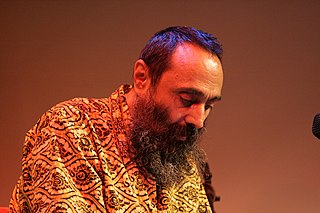
Antena 1 is a Romanian free-to-air television network owned by the Antena TV Group, part of the Intact Media Group. Its programming consists of television news programs, soap opera shows, football matches, entertainment programmes, movies and television series.
Romanian literature is literature written by Romanian authors, although the term may also be used to refer to all literature written in the Romanian language.

Marin Preda was a Romanian novelist, post-war writer and director of Cartea Românească publishing house. He is considered by some to be the most important novelist in post-World War II Romanian literature. However, he has also garnered an ambivalent perception in post-socialist Romania: Preda's final novel, Cel mai iubit dintre pământeni, published just a couple of months before his death, is considered a daring critique of the beginnings of communism in Romania; in contrast, Preda was well-regarded by party leaders and received high distinctions in socialist Romania, and did not position himself as an open opponent of the regime. At the time of his death, Marin Preda was a member of the Great National Assembly.

Harry Tavitian is a Romanian jazz pianist and singer, whose style covers free-jazz, blues, ethno-jazz and avant-garde.

Victor Rebengiuc is a Romanian film and stage actor, also known as a civil society activist.
Pericle Martinescu was a Romanian writer and journalist.
Moromeţii is a novel by the Romanian author Marin Preda, one which consecrated him as the most important novelist in the post-World War II Romanian literature.
Muurat Iusuf is a Romanian citizen Muslim cleric of Tatar origins, currently the Mufti of the Muslim Community in Romania.
The Group for Social Dialogue is a Romanian non-governmental organization whose stated mission is to protect and promote democracy, human rights and civil liberties. It was founded in January 1990 and issues the weekly magazine Revista 22.

The Mircea cel Bătrân Naval Academy is a higher education institution based in the Black Sea port of Constanța that educates future officers for the Romanian Naval Forces, as well as maritime officers and engineers for the merchant marine. At the request of the Romanian Coast Guard, the Naval Academy prepares coast guard officers.

Talpa is a commune in Teleorman County, Muntenia, Romania. It is composed of five villages: Linia Costii, Rotărești, Talpa-Bâscoveni, Talpa-Ogrăzile, and Talpa Poștei.
The Gopo Awards are the national Romanian film awards, similar to the Academy Awards (US), the Goya Awards (Spain), or the César Award (France). They are presented by the Association for Romanian Film Promotion and were inaugurated in 2007.
Mircea cel Bătrân National College is a high school located at 6 Ștefan cel Mare Street, Constanța, Romania. It was founded as a gymnasium on September 1, 1896 and took the name of Mircea the Elder in 1901.

Alexandru Pesamosca was a Romanian surgeon and pediatrician, medic at the Marie Sklodovska-Curie Hospital in Bucharest. He was the leading surgeon for over 50,000 medical surgeries on children at this hospital and other medical facilities in Romania and outside the country.
Florin Zamfirescu is a Romanian theatre and film actor and director, and university professor.
Aurora Cornu was a Romanian-born French writer, actress, film director, and translator. Her best known role is that of Aurora in Éric Rohmer's Claire's Knee.

Pavel Chihaia was a Romanian novelist.

Melania Ursu was a Romanian stage and film actress.
The Moromete Family is a 1987 Romanian drama film based on the first volume of the eponymous novel by Marin Preda.A sequel The Moromete Family 2 was filmed in 2017.

Irina Rimes, is a Moldovan-Romanian singer-songwriter who established herself as one of the leading music artists in Romania and Moldova since the late 2010s. She is one of the four coaches of the Romanian talent show Vocea României. Rimes works and lives in Bucharest, Chișinău, and Paris.










